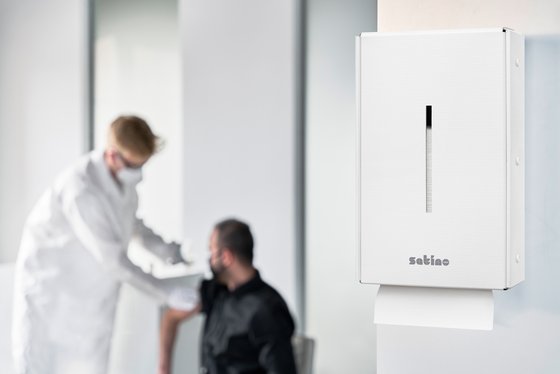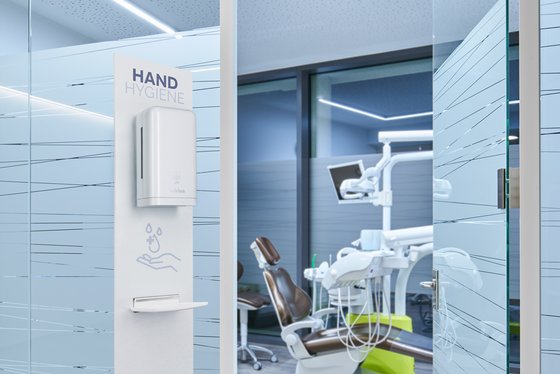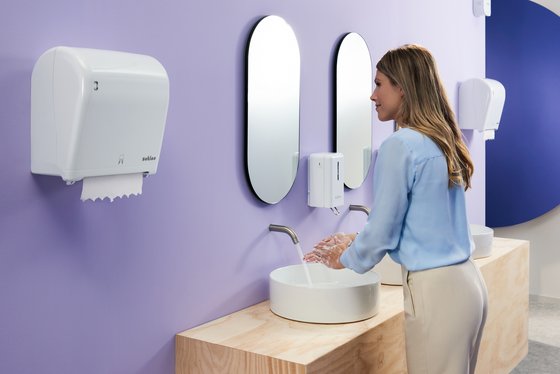
How closely hygiene and health are linked is one of the major insights of medicine. Hygiene is a duty and a matter of course in the health sector – and determines everyday work in doctors' practices, hospitals, nursing homes and homes for the elderly.
However, even if the effectiveness of hygiene measures has priority, other factors have also long been part of the discussion: for example the costs and economic efficiency of the equipment and materials used, the reliability and ease of maintenance of technical equipment, e.g. dispensing systems, and finally, the availability of consumables such as hygiene paper and disinfectants.
Therefore, rely on solutions that optimally meet the range of economic and practical challenges in healthcare – such as those from Satino.

Indispensable:
hand disinfection
Reliable hand disinfection cannot be done without in corridors, sickrooms and examination rooms, and also in entrance areas, lounges and washrooms. Disinfectants have different germicidal effects and prevent the spread of microorganisms, but less well known though is that the dispenser systems themselves can also make an important contribution to optimal hygiene.
- Successfully avoid contact surfaces: contactless Clean&Care dispensers
- Reliable helpers: manual Clean&Care dispensers
- Mobile solutions with a signal effect: sanitiser stands
- Block bacteria, fungi and viruses: hand disinfectants
The WHO "5 Moments for Hand Hygiene"
The WHO defines "5 Moments for Hand Hygiene", five specific occasions for hand hygiene:
- Before any touching or contact with patients
- After touching a patient
- After touching the patient's environment
- Before clean/aseptic procedures
- After contact with body fluids or potentially infectious substances

Hygiene in washrooms and toilets
Hand disinfection is indispensable, but this makes water and soap by no means superfluous – for example in examination rooms and washrooms for patients, staff or visitors. In addition to optimum hygiene, economy and service-friendliness of the equipment are also important.
- Flexible dispenser solutions for washrooms: Clean&Care dispensers for soap, disinfectant and toilet seat cleaner
- The means of choice: soaps and foam soaps
- Hygienic drying of hands: dispensers for towel paper
Economical and reliable: towel rolls
The plus for WC hygiene: toilet seat cleaner
The scientific community recommends towel paper
Drying hands is an essential part of handwashing because germs find ideal conditions to spread on damp hands.
Hospitals in Germany recommend disposable towels for drying hands, and the French Society for Hospital Hygiene SF2H also recommends paper towels but advises against using electric dryers in washrooms. The reason: air flow hand dryers swirl bacteria around the room, onto surfaces and onto clothing that may have remained on the hands.
Professional equipment for treatment rooms
Treatment rooms are where patients and staff are the closest – and hygiene counts just as much as practical usage.
- Disinfection without contact surface: touch-free Clean&Care dispensers
- Proven effectiveness: hand disinfectants
- The right solution for every patient couch: medical rolls from Satino
- Universally adjustable: the medical roll holder for wall mounting
A brief look at the environment
Where maximum hygiene is a priority, large amounts of waste are produced that cannot be avoided – e.g. from plastic bottles or other sterile packaging. On a small scale though, measures can be taken that are sustainable and conserve resources.
- No parabens or microplastics: soaps with EU Ecolabel
- No-compromise hygiene: Satino comfort recycled towel paper
- Economic efficiency with environmental compatibility: Satino comfort recycled toilet paper
Would you like to find out more, or do you perhaps already have specific questions?
In that case simply contact us: we have the right solutions for your company and your needs!
contact us
